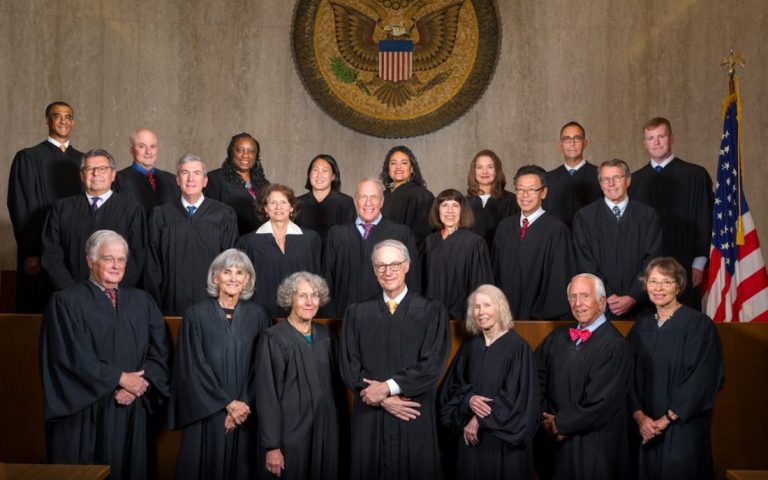
The question remains: Will they all be overturned by the U.S. Supreme Court?
New York, N.Y. — As President Donald Trump’s administration pursues sweeping policy changes in his second term, a new front has emerged in the nation’s courts.

Federal judges, particularly those in the 94 U.S. District Courts, have repeatedly issued nationwide injunctions to halt or delay key elements of Trump’s agenda, setting the stage for a constitutional showdown that could ultimately be decided by the U.S. Supreme Court.
The Role of U.S. District Courts
The U.S. District Courts serve as the nation’s trial courts, resolving disputes by determining facts and applying legal principles.
Each state, the District of Columbia, and four U.S. territories have at least one district court, each with the authority to hear federal cases, including those involving bankruptcy.
These courts are often the first stop for challenges to presidential executive orders and federal policies, making them a critical battleground for the Trump administration’s initiatives.
Heroes of Democracy
Federal Judges Who Have Blocked Trump Administration Policies Since January 20, 2025
Several federal judges across the United States have issued orders blocking or restricting key Trump administration policies since his return to office on January 20, 2025. Below is a summary of notable judges, the cities in which they sit, and the presidents who appointed them, based on the most recent and relevant cases:
Boston, MA
U.S. District Judge Julia E. Kobick (appointed by Biden) sided the with American Civil Liberties Union’s push for a preliminary injunction and blocked Trump Policy Banning X Gender Marker Passports.
U.S. District Judge Brian Murphy (appointed by Biden) issued injunction halting Trump administration’s from rapidly deporting migrants to countries other than their own without first giving them a meaningful opportunity to demonstrate fears of persecution, torture, or death.
Burlington, VT
U.S. District Judge William Sessions (appointed by Clinton) ruled Tufts University Ph.D. student Rumeysa Ozturk of must be returned by ICE from conservative Louisiana to liberal Vermont for the remainder of her immigration proceedings.
Concord, NH
U.S. District Judge Joseph Laplante (appointed by G.W. Bush) blocked end of birthright citizenship.
Providence, RI
U.S. District Judge John McConnell (appointed by Obama) blocked freeze on federal funding.
Richmond, VA
U.S. District Judge J. Harvie Wilkinson III (appointed by Reagan) issued a blistering order warning that the administration’s refusal to comply with court directives could undermine the constitutional order. Wilkinson wrote, “If today the Executive claims the right to deport without due process and in disregard of court orders, what assurance will there be tomorrow that it will not deport American citizens and then disclaim responsibility to bring them home?”
Seattle, WA
U.S. District Judge Lauren J. King (appointed by Biden) blocked cuts to hospital funding for gender-transition care.
Washington, DC
U.S. District Judge Amir H. Ali (appointed by Biden) blocked freeze on USAID funding.
U.S. District Judge Loren AliKhan (appointed by Biden) blocked suspension of federal funding.
Chief Judge James E. Boasberg (appointed by Obama)…
U.S. District Judge Rudolph Contreras (appointed by Obama) blocked wrongful termination of a federal employee.
U.S. District Judge Amy Berman Jackson (appointed by Obama) blocked dismantling of the Consumer Financial Protection Bureau
U.S. District Judge Carl Nichols (appointed by Trump) halted USAID staff dismissals, paused agency dismantling.
Additional issues in the courts
- Sanctuary Cities Funding: A federal judge in San Francisco is hearing a case challenging Trump’s executive order to withhold federal funds from sanctuary cities.
- Birthright Citizenship: Three separate judges, including Joseph Laplante (NH), have blocked Trump’s executive order aiming to deny citizenship to children born in the U.S. to undocumented parents.
- Federal Worker Purges: Multiple judges have intervened to halt or reverse the mass termination and reassignment of federal employees, including actions affecting USAID and the Consumer Financial Protection Bureau.
Federal judges in Washington, D.C., New Hampshire, Rhode Island, and Washington state—appointed by presidents from both parties—have issued significant rulings blocking or restricting Trump administration policies since January 20, 2025. Their interventions have targeted executive actions on funding, citizenship, transgender rights, and federal employment, often through nationwide injunctions that have become a focal point of legal and political debate
Nationwide Injunctions: A Powerful Judicial Tool

A central issue in the current standoff is the use of nationwide, or “universal,” injunctions. This legal mechanism allows a single federal judge to halt the enforcement of a government policy across the entire country, not just for the parties directly involved in a lawsuit.
While historically rare, the practice has become increasingly common in recent years, particularly during the Obama, Trump, and Biden administrations.
President Trump has faced more nationwide injunctions than any recent predecessor, with judges blocking actions ranging from immigration restrictions to changes in birthright citizenship and policies affecting transgender individuals in the military. Critics, including many of Trump’s political allies, argue that these injunctions thwart the will of the electorate and undermine the president’s ability to implement his agenda.
Congressional Response and Legislative Efforts

In response to what they view as “judicial overreach,” Republican lawmakers have introduced legislation aimed at curtailing the power of federal judges. The “No Rogue Rulings Act,” authored by Rep. Darrell Issa of California, seeks to restrict judges’ rulings to only the parties involved in a case, effectively eliminating the ability to issue nationwide injunctions. The bill passed the House of Representatives, reflecting growing frustration among Trump’s supporters with the judiciary’s role in blocking executive actions.
House Judiciary Chair Jim Jordan has briefed President Trump on plans to further examine and potentially reform the federal judiciary’s power. Impeachment of judges who have issued injunctions against Trump’s policies has been discussed, though there is currently insufficient support in Congress for such measures.
Supreme Court: The Ultimate Arbiter

With more than 100 lawsuits related to Trump’s actions currently in progress, many of which involve nationwide injunctions, the Supreme Court is under increasing pressure to clarify the limits of judicial authority.
Both Trump and his predecessor, Joe Biden, have urged the Court to restrict the use of universal injunctions, arguing that they cause significant disruption to the functioning of government.
The Supreme Court, which holds a 6-3 conservative majority including three Trump-appointed justices, has thus far issued only procedural rulings that have temporarily set back Trump’s efforts.
The legal merits of the challenges to Trump’s agenda have yet to be fully addressed by the Court, leaving the fate of these nationwide injunctions—and the broader balance of power between the branches of government—uncertain.
Judicial Independence and Public Confidence
The escalating conflict between the executive branch and the judiciary has raised concerns about the independence of the courts and the public’s confidence in the justice system.
Judges and prosecutors handling high-profile cases related to Trump have faced threats and harassment, prompting the Federal Judges Association to issue a statement condemning such actions and warning that “irresponsible rhetoric shrouded in disinformation undermines the public’s confidence that our justice system can fulfill its constitutional duties.”
Chief Justice John Roberts, in his 2024 year-end report, emphasized the importance of judicial independence and the need for the other branches of government to respect and enforce court decrees. Instances of the Trump administration sidestepping or defying court orders have further fueled debate over the limits of executive power and the effectiveness of judicial oversight.
The Push for Executive Power
Trump’s assertive approach to executive authority has tested the constitutional system of checks and balances. While Congress has provided little resistance, the federal judiciary has emerged as a key counterweight, issuing rulings that have, at times, forced the administration to alter or suspend its policies.
Some legal scholars warn that efforts to limit the courts’ jurisdiction and concentrate power in the executive branch echo historical models of governance where tyranny expands without dismantling the courts themselves—a phenomenon described by political scientist Ernst Fraenkel as the “dual state.” In this model, independent judges continue to perform their functions, but their ability to check executive power is systematically eroded.
Debate Over Judicial Activism and Partisanship
The debate over nationwide injunctions and judicial resistance to Trump’s agenda has taken on a partisan tone. Trump loyalists have accused “activist judges” of blocking the president’s policies for political reasons, while others point out that judges appointed by both Democratic and Republican presidents have issued such rulings. The increasing politicization of the judiciary has raised questions about the long-term implications for the rule of law and the separation of powers.
Looking Ahead: Supreme Court’s Pivotal Role
As the Supreme Court prepares to hear cases challenging the use of nationwide injunctions and the limits of presidential authority, the outcome could have far-reaching consequences. A decision to uphold or overturn the lower court rulings will not only determine the fate of Trump’s current agenda but also set precedents that will shape the relationship between the executive and judicial branches for years to come.
The stakes are high: a ruling that sharply limits the power of federal judges could embolden future presidents to act with fewer constraints, while a decision affirming the judiciary’s authority to issue nationwide injunctions would reinforce the courts’ role as a vital check on executive power.
The ongoing struggle between President Trump’s administration and the federal judiciary underscores the enduring importance of the constitutional system of checks and balances.
As nationwide injunctions stall key elements of Trump’s agenda and Congress debates reforms to limit judicial power, all eyes are on the Supreme Court. Its decisions in the coming months will not only resolve the immediate legal disputes but also help define the boundaries of presidential authority and judicial independence in the United States.
Whether the Supreme Court will overturn the resistance of federal judges or uphold their rulings remains an open question—one with profound implications for the nation’s legal and political future.
U.S. Federal Judges Unexpected Resistance to Trump’s Agenda (April 19, 2025)
#FederalJudges #TrumpAgenda #SupremeCourt #JudicialResistance #NationwideInjunctions #USDistrictCourt #ChecksAndBalances
#JudicialIndependence #USPolitics #ConstitutionalLaw
Tags: Trump, federal judges, Supreme Court, nationwide injunctions, district courts,
judicial resistance, executive orders, Congress, constitutional law, U.S. politics
